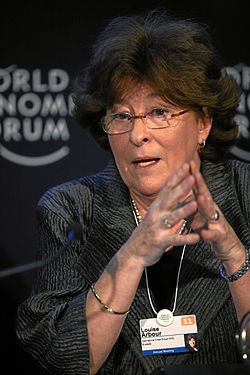Louise Arbour | |
|---|---|
 Arbour in 2011 | |
| United Nations Special Representative for International Migration | |
| In office March 1, 2017 –December 31, 2018 | |
| Secretary General | António Guterres |
| Preceded by | Peter Sutherland |
| Succeeded by | Position abolished |
| United Nations High Commissioner for Human Rights | |
| In office July 30,2004 –August 31,2008 | |
| Secretary General | Kofi Annan Ban Ki-moon |
| Preceded by | Sérgio Vieira de Mello |
| Succeeded by | Navi Pillay |
| Puisne Justice of the Supreme Court of Canada | |
| In office September 15,1999 –July 28,2004 | |
| Nominated by | Jean Chrétien |
| Preceded by | Peter Cory |
| Succeeded by | Rosalie Abella/Louise Charron |
| Chief Prosecutor of the International Criminal Tribunals for Rwanda and the former Yugoslavia | |
| In office October 1,1996 –September 15,1999 | |
| Secretary General | Boutros Boutros Ghali Kofi Annan |
| Preceded by | Richard Goldstone |
| Succeeded by | Carla Del Ponte |
| Personal details | |
| Born | February 10,1947 Montreal,Quebec,Canada |
| Children | 3 |
| Alma mater | Collège Regina Assumpta (DEC) Universitéde Montréal (BA,LLL) University of Ottawa |
Louise Arbour, CC , GOQ (born February 10,1947) is a Canadian lawyer,prosecutor and jurist.
Contents
- Early life and education
- Personal life
- Legal career
- Canada
- The Hague
- Supreme Court of Canada
- Career after law
- United Nations High Commissioner of Human Rights
- Works and awards
- See also
- Footnotes
- External links
Arbour was the UN High Commissioner for Human Rights,a former justice of the Supreme Court of Canada and the Court of Appeal for Ontario and a former Chief Prosecutor of the International Criminal Tribunals for the former Yugoslavia and Rwanda. From 2009 until 2014,she served as President and CEO of the International Crisis Group. [1] She made history with the indictment of a sitting head of state,Yugoslavian president Slobodan Milošević,as well as the first prosecution of sexual assault as a crime against humanity. From March 2017 to December 2018 she was the Special Representative of the United Nations Secretary-General for International Migration. [2] She is currently in private practice in Montreal. [3]